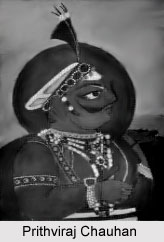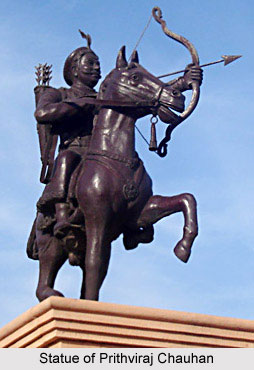 Prithviraj Chauhan was a king of the Rajput Chauhan (Chahanama) dynasty, who ruled a kingdom in northern India during the latter half of the 12th Century. Prithviraj Chauhan was the second last Hindu king to sit upon the throne of Delhi. He succeeded to the throne in 1179 AD at the age of eleven, and ruled from the twin capitals of Ajmer and Delhi. He became the sovereign power of much of Rajasthan and Haryana, and unified the Rajputs against Muslim invasions. However the reign of Prithviraj Chauhan constituted an important era in the history of ancient India.
Prithviraj Chauhan was a king of the Rajput Chauhan (Chahanama) dynasty, who ruled a kingdom in northern India during the latter half of the 12th Century. Prithviraj Chauhan was the second last Hindu king to sit upon the throne of Delhi. He succeeded to the throne in 1179 AD at the age of eleven, and ruled from the twin capitals of Ajmer and Delhi. He became the sovereign power of much of Rajasthan and Haryana, and unified the Rajputs against Muslim invasions. However the reign of Prithviraj Chauhan constituted an important era in the history of ancient India.
Political Career of Prithviraj Chauhan
Prithviraj Chauhan ascended to the throne of Delhi at an early age of eleven. Prithviraj at his early age proved himself as a competent administrator and a military expert. From the beginning of his political career, Prithviraj III was engaged in the hereditary rivalry with the Chalukya king of Gujarat. But at that very moment he was confronted with the Turkish invasion from Punjab. The Chauhana kingdom during the reign of Vigraharaja IV was extended up to the confines of the Turkish kingdom of the Ghoris of the Northwest. This resulted in the hereditary struggle of the Turks with the Chauhans. This made the conflict between them inevitable.
Prithviraj was confronted with a great dilemma when Muhammed Ghori marched against the Chalukyas of Gujarat. At that time Muhammed of Ghori sought the alliance of Prithviraj Chauhan against the Chalukya adversary. Prithviraj adopted a policy of shrewd diplomacy in order to crush both the enemies. Thus Prithviraj adopted a policy of hostile neutrality and discarded the alliance with the Ghori. Ultimately Mulraj, the Chalukya king of Gujarat had routed the Turks in the Battle of Mount Abu.
Treaty of Bhim II between Chalukyas and Prithviraj
The defeat of Mohammed Ghori opened to Prithviraj to execute his policy of conquest. Prithviraj conquered the Rewari district and a part of Alwar state in 1182 AD. The same year he defeated the Chandella king Paramardi and annexed a part of his dominion. But the Chandellas soon recovered their territory from him. Prithviraj in due course also led a campaign against his old adversary but he failed to attain any considerable success. However the hostility between the Chauhans and the Chalukyas came to an end with the alliance treaty of Bhim II with Prithviraj Chauhan.
 First Battle of Tarain
First Battle of Tarain
The greatest event of Prithviraj`s career is his struggle with Muhammed Ghori. The struggle of Prithviraj Chauhan with the Turkish power Muhammed of Ghori constituted a significant event in the history of ancient India. Since the annexation of Western Punjab by Muhammed of Ghori, the Chauhana territory of the eastern Punjab was threatened. Muhammed attempted to conquer Hindustan in 1190. Initially as strategic step, he devastated the fortress of Tabarhind, which was within the territory of Prithviraj Chauhan. At the same time the feudatories of Prithviraj also suffered the same reverses. This made the struggle between the Turks and Prithviraj Chauhan inevitable. Thus Prithviraj set out for the campaign against Muhammed Ghori. In the First Battle of Tarain Prithviraj routed the Muhammed of Ghori. Ghori fled from the battlefield being highly injured. Prithviraj followed up his success by taking the possession of the fortress of Tabarhind from the Turkish invaders.
Second Battle of Tarain
The defeat of the Turks in the First Battle of Tarain in 1191 AD could diminish the Turkish power. Ghori reappeared in the 1192 AD with a huge army in Punjab resulting in the Second Battle of Tarain. This time Muhammed of Ghori planned his strategy from the very beginning. Muhammed recaptured Tabarhind and reached the field of Tarain without meeting any serious opposition in the way. Meanwhile Prithviraj entered in a confederacy with several Hindu kings. Prithviraj, being an expert statesman could understand that Ghori had come with enormous preparations to conquer Hindustan. Therefore he wanted to strengthen his confederacy with the Hindu kings. But the Gahadavala king of Kanauj, Jayachandra stayed aloof from the anti-Turkish confederacy organized by Prithviraj Chauhan. Thus Jayachandra continued the hereditary rivalry with the Chauhans.
However Prithviraj Chauhan blocked the passage of Muhammed Ghori in the field of Tarain. During this battle Prithviraj did not even get the support of his competent general Skanda. Muhammed Ghori by his superior generalship and tactics completely routed the Hindu army. In the Second Battle of Tarain, thus the Hindu supremacy was dashed by the Turkish army. Prithviraj was imprisoned and executed. His brother was also slain. The crushing defeat of the Hindu supremacy in the Second Battle of Tarain determined the Muslim supremacy in India. The subsequent attack of the Hindu kings against the Turks proved utterly futile. The Second Battle of Tarain is regarded by the historians as the turning point of Indian History. After this battle the Muslim power was strongly founded in Northern India.
Critics on the Marriage of Prithviraj Chauhan
Regarding the hereditary rivalry of Jayachandra with the Chauhana House the critics and the historians have approached several theories. Perhaps Prithviraj`s forcible marriage with Jayachandra`s daughter Samyukta injured the vanity of the Gahadavala king Jayachandra. Hence Jayachandra decided to remain aloof from the anti-Turkish confederacy organized by Prithviraj Chauhan. But the recent researches proved that the story of Prithviraj`s forcible marriage with Sanyukta is spurious. There was no authentic proof about this forcible marriage. Moreover there is no authentic testimony of the fact that Jayachandra was an oppressor and invited Muhammed Ghori to invade Delhi.
Prithviraj Chauhan was a great soldier but he actually lacked the political insight of a diplomatic administrator. Although he could not conquer many territories like the other Indian rulers, yet he proved himself as an able soldier in the first battle of Tarain. He could not understand the true nature of the Muslim invasion until the blow came upon him. Moreover he chose to be defensive towards his enemy. He did not pursue the Turks after his victory in the First Battle of Tarain. He neglected to fortify his Empire after his initial victory against the Turks and he failed to execute his strategy properly. However the sudden invasion by Muhammed Ghori in the 1192 AD, determined his decline as well as the Hindu Supremacy in India.



















